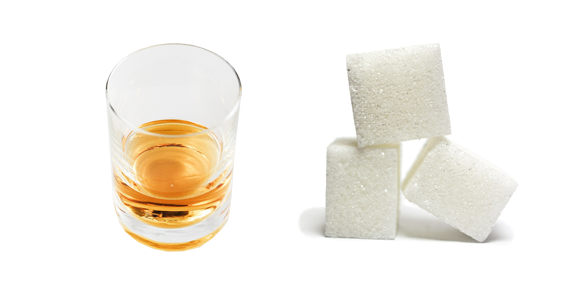alcohol and excess sugar

Excess sugar
According to what we think, Suffering from diabetes does not necessarily mean that our diet is too rich in sugar. This is because his pancreas no longer secretes or secretes a small amount of insulin, a gland or hormone that will regulate blood sugar to a normal value. A diet that is too high in sugar raises blood sugar, which in turn wears out and causes the pancreas to work, which may not work normally, leading to diabetes.
It is the same during the consumption of our natural products, we demand a total restriction of the sugar during a treatment with our natural treatments for fear of creating interactions which could affect its efficiency in the organism.
Alcohol and natural treatment
Avoid risk refreshments
When you are on treatment, consuming alcohol is not without risk. The only way to avoid these risks is to not consume alcohol. But who cannot be tempted from time to time by a drink? So, it is better to know the possible interactions between alcohol and our natural products used.
How is treatment and alcohol influencing mutually?
When you consume alcohol while you are on natural treatment, these are found in your body. If the neighborhood is not always a risk, you should know that alcohol disrupts the effectiveness of any type of treatment and unlike; some treatments amplify the effects of alcohol.
Three possible cases may occur:
Some drugs generally slow down the elimination of alcohol by the body. The sedative impact of alcohol – the desire to sleep or the feeling of tiredness that one feels after consuming is thus intensified – the risk of drowsiness increases, while the concentration decreases. Other unpleasant effects of alcohol may appear.
Alcohol limits the ingestion of certain drugs and / or accelerates their elimination by the body. The effects of the drugs will be weakened. Be aware that consuming alcohol while you are on treatment does not necessarily mean “at the same time” even allowing hours or days to pass between taking the products and drinking alcohol, the effects of the latter may still be troubling. Similarly, alcohol, well known to be a leading cause of liver disease, can also put other organs at risk.
Alcohol may be a factor in depression and anxiety. A study also found that high consumption in the elderly can increase the risk of Alzheimer’s disease. According to the International Cancer Institute, alcohol is a risk factor for many types of cancer, including: cancer of the mouth, breast, throat, liver, and bowel. Alcohol consumption weakens the immune system, making the body more vulnerable to diseases, or infections such as tuberculosis and pneumonia. Excess alcohol is harmful to your liver, which can accumulate fat deposits and risk complications such as alcoholic hepatitis, fibrosis, and cirrhosis.
Alcohol
- Never drink for the purpose of being drunk ;
- After a wet night, detoxify your body with a high water intake ;
- Keep a diary and record the days with and without alcohol ;
The effects of alcohol on our body
Every time we drink alcohol, the vast majority of alcohol is absorbed directly into the bloodstream. Even though the need to urinate is felt more frequently, only a small amount of alcohol is eliminated by our body. The majority is absorbed and spread in the body and can have a serious effect on our organs and our overall health, including:
- Bladder : The need to urinate occurs more frequently because we drink a lot of fluid and at a speed that is too fast for our body. Our bladder tries to rid our body of toxins of alcohol. This excessive urging of the bladder may eventually weaken it and lead to incontinence ;
- The pancreas : Excessive alcohol consumption can prevent the pancreas from functioning properly and help the gallbladder to digest food properly. Excess alcohol is the most common cause of chronic pancreatitis ;
- Liver : excess alcohol is undoubtedly one of the most damaging factors for this organ whose primary mission is to break down harmful substances and allow your body to eliminate them, especially alcohol. This excess of alcohol can lead to many complications: jaundice, chronic inflammation of the liver, or even liver cancer ;
- Nervous system : Excessive alcohol consumption can inhibit your body’s ability to function properly. This may include an inability to walk, slurred speech and lack of balance. This also leads to memory loss, and an inability to think clearly. If alcohol abuse is prolonged and regular, the long-term health effects are considerably increased, with serious pathologies such as dementia, seizures, and serious vision problems.
Alcohol dependence
According to the experts, alcohol is the most addictive substance in the world, even before nicotine and category A drugs. Alcohol dependence cases can present serious health complications both physically and psychologically.






